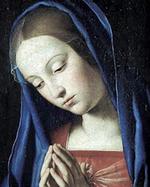Fathers of the Church
Epistle XLVIII: to Columbus, Bishop
by Gregory the Great in 590-604 | translated by James Barmby, D.d
Gregory to Columbus, &c.
Even before receiving thy Fraternity's letter, I knew thee from the report of thy deserved reputation to be a good servant of God. And now that I have received it, I understand more fully that what fame had already spread abroad was well founded; and I greatly rejoice in thy deserts, in that thou exhibitest manners and deeds that testify to a praiseworthy life. Since, then, I feel that these things are conferred on thee by the Supernal Majesty, I congratulate thee; and I bless God our Creditor, who denies not the gifts of His mercy to His humble servants. On this account I declare it to be true that thy Fraternity so kindles me with the flame of charity to love thee, and my spirit is so united to thee, that I both desire to see thee and am also with thee in heart, though absent. Thou perceivest in thine own thoughts that this is so. For in truth unity of minds in charity has power to unite more than bodily presence can. Furthermore, that with thy whole mind, thy whole heart, thy whole soul, thou cleavest and art devoted to the Apostolic See I am now assured, as, indeed before thy letter had borne testimony to the fact, I plainly knew. Wherefore, first addressing thee with the greeting of charity which is due, I exhort thee not to cease to be mindful of what thou hast promised to the blessed Peter, Prince of the apostles.
Wherefore be thou urgent with the primate of thy synod, that boys be in no wise admitted to sacred orders, lest they fall by so much the more dangerously as they hasten more speedily to mount to higher places. Let there be no venality in ordination: let not the influence or entreaty of any persons obtain anything in contravention of these our prohibitions. For without doubt God is offended if any one is promoted to sacred orders, not for merit, but by favour (which God forbid) or venality.
If, then, thou art aware of these things being done, keep not silence, but oppose them urgently; since, if perchance thou shouldest neglect them, or conceal them when known of, the chain of sin will bind not those alone who do such things, but no light guilt before God will touch thee also in the matter. If, then, anything of the kind is committed, it ought to be restrained by canonical punishment, lest so great a wickedness, with sin in others, acquire strength from connivance.
I have, therefore, the sooner given leave of departure to the bearer of these presents, Victorinus, thy Fraternity's deacon, whom I think to be thy imitator, and whom I have received with charity; and by him I have transmitted to thee for a blessing keys of the blessed Peter, in which something from his chains is included.
Lastly, with regard to the unity and peace of the council which, under God, you are taking measures to assemble, let thy Charity rejoice my mind by informing me of everything particularly.
Taken from "The Early Church Fathers and Other Works" originally published by Wm. B. Eerdmans Pub. Co. in English in Edinburgh, Scotland, beginning in 1867. (LNPF II/XII, Schaff and Wace). The digital version is by The Electronic Bible Society, P.O. Box 701356, Dallas, TX 75370, 214-407-WORD.






